Charleston Airport's Newest Employee
Russ Kennedy, Yeager Airport, Charleston, WVA
 Russ Kennedy held down security at Charleston's Yeager Airport. He was also the handler for Greg, a border collie that clears runways from geese and other wildlife that could cause a fatal aircraft accident.
Russ Kennedy held down security at Charleston's Yeager Airport. He was also the handler for Greg, a border collie that clears runways from geese and other wildlife that could cause a fatal aircraft accident.
As well as the Airport Response Coordination Center Duty Officer, Russ was also the Assistant Airport Security and part of the BASH (Bird & Wildlife Strike Hazard) Team. Part of Russ' job was getting rid of birds and wildlife off the runways. This is so that planes don't hit them or they don't get sucked into the engines resulting in accidents. But he didn't do this job alone; he had a partner to help him.
Russ' partner was a Border Collie named Greg. He was on loan from a company out of North Carolina called, "Fly Away Geese." Basically, Greg taught Russ how to do the job. Greg was on hand until the airport got their own full-time Border Collie named Hercules. Hercules was named after the C-130's that shared the airfield with them with the 130th Airlift Wing.
Basically the job of these dogs is to chase the wildlife off the air strip to keep them from getting ingested into an aircraft, or possibly striking a windshield or anything else that would create damage to the aircraft or the passengers on the commercial airlines.
However, you won't see Greg just running around outside of the airport chasing birds and other wildlife. There is an actual vehicle that Greg rides in. Greg is driven out to the airfield when they look for animals.
Greg is trained in the same aspects of a Border Collie who would herd sheep. They have specific commands that they can give him out on the airfield to push animals left, right and even forward. Russ says Greg is almost like a remote control.
They also use Greg to run geese off of a local park that's right in the flight path. It's down the hill from the airport and has a pond that the geese and ducks will congregate in. Greg actually loves to swim and will chase the birds out of the water so they will fly away.
Does Greg ever try to catch any of the wildlife? No. Being a Border Collie, his instinct isn't to hurt. Russ says Greg is PETA friendly and he just wants to herd the animals. He doesn't want to hurt them.
Along with birds, rabbits are also a problem because they are the prey of some birds. Russ explains that there are several raptor species in the area, and with Greg pushing the rabbits outside of the fence area, the birds fly away from the air surfaces and stay out of the way from the airfield and away from the aircraft.
So what made the Yeager Airport decide to get a runway dog? Do they have a big problem there with birds and wildlife on the runaways? Russ tells us that they didn't really have a huge issue with them, they were just being more proactive.
The airport has teamed up with the USDA's Wildlife Management Team and the Bird & Wildlife Strike Airstrike Hazard (BASH) program. Basically, the USDA's Wildlife Management Team brought up the idea of the Border Collies that have been immensely used on golf courses to harass geese and ducks out of their water hazards and ponds. The ideal was that if they can be used at golf courses to get rid of the geese and ducks, why couldn't they be used at airports and military installations to move the wildlife out of areas that they shouldn't be in.
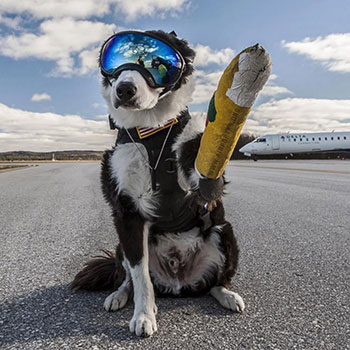 In working with Greg, Russ learned that he is very intelligent. He's the reason they brought Greg to the airport prior to Hercules coming on board. With Greg being well versed in how to do his job, he actually taught Russ what to look for once Hercules got there. Greg is showing Russ this is how Hercules should act once he got here. That way Russ can know the difference between a good reaction and a bad reaction so they can correct Hercules as need be if he's doing something he shouldn't be.
In working with Greg, Russ learned that he is very intelligent. He's the reason they brought Greg to the airport prior to Hercules coming on board. With Greg being well versed in how to do his job, he actually taught Russ what to look for once Hercules got there. Greg is showing Russ this is how Hercules should act once he got here. That way Russ can know the difference between a good reaction and a bad reaction so they can correct Hercules as need be if he's doing something he shouldn't be.
It can cost anywhere from $10,00 and upwards to train these dogs. Usually they work about 8 to 10 years, but it really depends upon the dogs themselves. Russ worked hand in hand with a local veterinarian that keeps on Hercules' health. If there ever came a point that the veterinarian said he's reached his maximum years, then they would retire him.
It's no coincidence that both Greg and Hercules are males. It turns out that male dogs are generally sent to airports and military installations due to the fact that the male dogs they use are "in tact," which means that they have not been neutered. Un-neutered dogs tend to mark their territories more than neutered dogs. So when they mark their territory, the birds and the other animals don't know the difference between a dog and a wolf or a coyote. All they smell is a predator in their territory.
When the actual coyotes and other wild dogs then mark their own territories over these working dogs, the dogs will of course go back and then mark over the coyotes. This cycle will continue and eventually the birds will get tired of their territory being encroached on and they will find somewhere else to go.
The other animals, like rabbits, will also get tired of being harassed. They will not be provided any food and when they are constantly being harassed by what they feel is a predator, they're also going to go find somewhere else to go.
In the evenings when the dogs are not working, they stay at the airport. Hercules has a schedule that puts him to bed around 11:00pm. While in bed, he's in his own room with the lights out and doors closed. There are no stimulation as far as visual or scents area concerned. This way he gets a good eight hours worth of rest. In the mornings, Monday through Friday when Russ arrived, he took him out of his room to go out on the airfield and work. Hercules gets Saturdays and Sundays off. This allowshim to sit around and to play fetch just like a regular dog.
Russ explained that most airports don't have these types of working dogs at this time. This is mostly due to the expense and the unavailability of trained dogs. However, with the USDA Wildlife backing the programs, you're probably going to see a lot more.
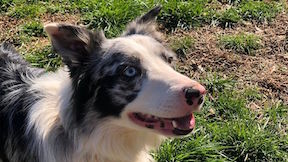 The first well-known airfield dog was Piper. And just like Yeager Airport is doing with Greg, Piper was a big public relations boost. People love to see dogs, so the airlines will announce that Greg is about to go out and do his job and where he's going to be.
The first well-known airfield dog was Piper. And just like Yeager Airport is doing with Greg, Piper was a big public relations boost. People love to see dogs, so the airlines will announce that Greg is about to go out and do his job and where he's going to be.
If there's inclement weather, they can also use Greg to kind of calm down passengers. If they have a young child that's never flown before or even an adult that's never flown before, they can take Greg up to the concourse and walk him around the people, as most people love to see a dog.
One of the stories Russ likes to tell is about a passenger who posted on their Facebook page that she was having the worst day ever. She was flying out of the airport. It was inclement weather and there were several delays and several cancellations due to the weather up and down the coast. She was going on a short vacation and because of this, she missed her connection and was stuck at Yeager Airport. Unbeknownst to Russ, he walked Greg out into the concourse where she was and just by chance they ended up walking right past her. Greg then went over and said hi. She petted him and it calmed her down. She was like, "You know, you've just made my day a thousand times better!" Then the next thing Russ knows, he was getting a text message from his assistant director that there was a young lady in Concourse C that was not happy. Russ immediately texted him back and said that he met her and that he thinks she's happy now!
You can see pictures of Greg and Hercules on their Instagram and Facebook pages.
Animal Radio Flashback

Bart Simpson Has a Cow
Nancy Cartwright

Nancy Cartwright really loves animals. She has an entire menagerie at her L.A. ranch. Her prized pet is a fiberglass cow. Nancy is an American actress, voice actress and comedian and is known for her long-running role as Bart Simpson on the animated television series The Simpsons. Nancy also voices other characters for the show, including Nelson Muntz, Ralph Wiggum, Todd Flanders and Database.
Nancy was born in Ohio and moved to Hollywood in 1978 and trained alongside voice actor Daws Butler. In 1987, Cartwright auditioned for a role in a series of animated shorts about a dysfunctional family that was to appear on The Tracey Ullman Show. Cartwright intended to audition for the role of Lisa Simpson, the middle child; when she arrived at the audition, she found the role of Bart-Lisa's brother-to be more interesting. Matt Groening, the series' creator, allowed her to audition for Bart and offered her the role on the spot. She voiced Bart for three seasons on The Tracey Ullman Show, and in 1989, the shorts were spun off into a half-hour show called The Simpsons.
Nancy is crazy about her family of animals and lives in a "ranch-style" country house with on an acre with "tons" of pets. Her menagerie includes, 2 dogs, 3 cats and sea horses. However, she states that, "My prized pet would probably be my life-sized, fiberglass Holstein cow, named Milk Dud." She goes on to state that, "She doesn't actually give milk, unfortunately, but I had to do it because of the "Don't have a cow man!" because I decided I should have a cow!"
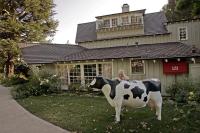 The first pets that she had growing up were Bassett Hounds. She remembers one named Lady, when she was about four years old. When Lady had puppies, they named the one they kept, Pearl. She always had dogs growing up, and doesn't know why they never had cats. However, as soon as she could, she got cats.
The first pets that she had growing up were Bassett Hounds. She remembers one named Lady, when she was about four years old. When Lady had puppies, they named the one they kept, Pearl. She always had dogs growing up, and doesn't know why they never had cats. However, as soon as she could, she got cats.
Nancy mentions that, "I don't know if other kids make this mistake, but when I was growing up, I always thought that dogs were the males and cats were the females," She exclaims, "I don't know how long I went before figuring that one out!"
Despite the fact that she is the most recognizable cartoon voice in the world, Nancy says nobody recognizes her voice in the "real world."
Visit Website
Black Widow Spiders Poisonous to Pets - Dr. Debbie
 Pet Threats Come in All Sizes
Pet Threats Come in All Sizes
Our doggie family ambled along on our typical morning walk along the community trail. With a family of two Labradors and a Yorkie mix, my crew is always up for fun and they investigate anything and everything.
Sometimes it's a crunchy cockroach snack or the fortunate edible remnant in a discarded candy wrapper. My dogs enjoy the "date game" where they snatch up shriveled fruit fallen from date palms, crunching away before the mom and dad notice. And sometimes it's a half-hearted game of chase with an unsuspecting rabbit. A more gut wrenching episode once involved my Labrador ingesting a rat with tail slipping down his gullet like a piece of spaghetti. My furry kids are professional trouble finders so I try to keep a watchful eye for things that make them go "Oooh," and make me go "Ugh!"
Female Black Widow Spider
While walking along the pedestrian pathway we came upon today's discovery - spiders and lots of them living in the recesses of a block wall. The hairs on my arm stood up as my Yorkie mix approached their lair. I recognize what these spiders are and what could happen to a 16-pound pup.
The long legged spiders were over 1 1/2" in length, black in color with a distinctive orange hourglass mark on its underbelly. Meet the black widow spider, a common arachnid found in every state in the U.S. except Alaska.
The Black Widow Bite
Black widow spiders contain a potent neurotoxin that causes pain, swelling and can lead paralysis. Female black widows are the dangerous ones, while the males rarely ever bite. While some black widow bites go unnoticed, others cause immediate pain at the site or result in pain at the nearest lymph node. Pain intensity reaches its maximum within 1 to 3 hours after the bite, but can last up to 48 hours.
Symptoms of a black widow bite appear within 8 hours after bite an include muscle twitching, restlessness, rigid abdomen and difficulty breathing. Symptoms may result in high blood pressure, a racing heart rate, seizures and collapse. Dogs are more resistant to a black widow bite, but still can suffer serious illness. Cats are very sensitive to the toxins and can suffer fatalities.
Symptoms of black widow bite include:
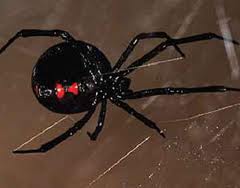 - Pain and numbness around bite site
- Pain and numbness around bite site
- Anxiety
- Racing heart rate
- Muscle pain and stiffness, especially abdominal muscles
- Difficulty breathing
- Paralysis
- Seizures
Treatment for Black Widow Spider Bite
Call your veterinarian if you suspect your pet was bitten by a black widow. Initial home emergency care of a black widow bite may include ice packing bite area and oral antihistamines like Benadryl. Your veterinarian will need to see your pet to evaluate and treat the more serious symptoms. Treatment may include medications to control muscle spasms and seizures. Blood pressure and blood sugar are monitored and intravenous fluids may be administered. An antivenin is available for more serious confirmed cases of black widow bite.
Prevention
Avoidance of spider habitats is the best prevention. These eight-legged critters favor dark recesses both indoors and outdoors. Look for cobwebs with a distinctive funnel-shaped opening at the top. And keep a close eye on your dog when out exploring. Inquire about spider control methods with your pest control company.
With pet noses so close to web level, the risk of black widow bites is just natural to being a dog. Our morning spider encounter ended without any drama, thankfully. After one firm "No!" my doggies retreated to unearth some other lucky find. Here's to hoping it doesn't involve any rats or bugs next time.
Featured veterinarian known as "Dr. Debbie" on national pet radio program, Animal Radio. Ebook author of "Yorkshire Terriers: How to Be Your Dog's Best Friend"; "Pugs: How to Be Your Dog's Best Friend"; "Mini Schnauzers: How to Be Your Dog's Best Friend"; and "Shih Tzu: How to Be Your Dog's Best Friend." Dr. Debbie's books.
Visit Website
Animal Radio News - Lori Brooks
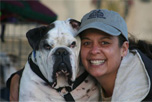 Counting Cats
Counting Cats
A coalition of animal groups in Washington, D.C., created the D.C. Cat Count, which tried to create a more accurate estimate of the city's entire cat population, including both feral and pet cats. The project took years and cost around $1.5 million. The groups hope the information would help improve efforts to manage the cat population. The project used many different strategies to arrive at a total population count, including an app allowing residents to snap their own images of cats they encountered.
Bucket List Dog Finds Forever Home
A terminally ill shelter dog checked off the biggest item on his bucket list: finding a forever home. You might remember Smoke's story about his bucket list and search for a home. Fortunately, the hound mix with advanced cancer found his forever home.
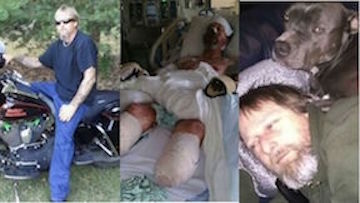 Man's Legs and Hands Amputated After Dog Lick
Man's Legs and Hands Amputated After Dog Lick
A man from Wisconsin had part of his arms and legs amputated after contracting a very rare infection, believed to have been caused by a dog lick. It wasn't just that a dog licked him, but the dog licked an open wound. This led to the very rare blood infection caused by common bacteria called capnocytophaga canimorsus, which is found in the mouths of dogs and cats and even humans. Animal experts jumped on this story right away, saying most people have an extremely small risk of contracting a similar infection from their pet. They also stress it is certainly no reason for anyone to give up a beloved companion. Up to 74-percent of dogs and 57-percent of cats have some form of capnocytophaga in their mouths. Testing your pet for the bacteria won't help, because an animal might have the bacteria one day but not have it the next. It is very rare for humans to contract the infection. In fact, experts don't know exactly how many people are infected with capnocytophaga annually, because there's no agency that keeps a record of cases. Some people are more at risk than others. People who have lost their spleen and people who are immune compromised are more likely to get sick from the bacteria. In fact, experts say a person without a spleen should go to a doctor for any dog bite, even a "little nip" that most people would not need to worry about.
 Is It A Dog or a Ball?
Is It A Dog or a Ball?
A dog groomer in Japan was literally turning dogs into fluff balls. Yoriko Hamachiyo was clipping usually small dogs into a ball. He did this by cutting their hair so they looked like a soft, fluffy round ball, a ball with legs.
It's Not About the Size - But the Lift When it Comes To Dogs
Dogs can communicate through scent, leaving their mark everywhere. They urinate on new areas, their own home turf and things that other dogs have peed on. Some male dogs lift their legs in order to pee higher. However, research found that smaller dogs lift their legs at an even higher angle than larger dogs, perhaps to make themselves appear larger. The study was published in the Journal of Zoology. The researchers from Cornell University first had to establish that the angle a dog raised its leg is a good stand-in for how high the pee goes. They took a bunch of shelter dogs for walks and filmed them peeing with an iPhone, and in some cases, a high-speed camera. Based on their analysis, how high the dog raised its leg could predict how high the pee would go, as could the dog's mass and height. Next, they analyzed how a dog's size compared to how much it lifted its leg. Both lighter and shorter dogs lifted their legs to higher angles than larger dogs. The little dogs seemed to be trying to leave a pee signature of a larger dog. They seemed to "cheat" by using higher raised-leg angles to leave higher urine marks, thus exaggerating their size to other dogs that would come along and sniff later.
Pig Halted Robbers
Police in Indiana believe a pet pig was better than a burglar alarm in this case because the rescued pig stopped would-be robbers from burglarizing a home in Indianapolis. Burglars broke into the home but they didn't steal anything. The pig apparently surprised the burglars who weren't counting on dealing with a pig inside the house. They ended up leaving without taking anything, though the back door was damaged.
 Listen to the entire Podcast of this show (#1244)
Listen to the entire Podcast of this show (#1244)





